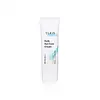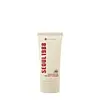What's inside
What's inside
 Key Ingredients
Key Ingredients

 Benefits
Benefits

 Concerns
Concerns

No concerns
 Ingredients Side-by-side
Ingredients Side-by-side

Water
Skin ConditioningEthylhexyl Methoxycinnamate
UV AbsorberGlycerin
HumectantPropylene Glycol
HumectantCyclopentasiloxane
EmollientBis-Ethylhexyloxyphenol Methoxyphenyl Triazine
Skin ConditioningPhenylbenzimidazole Sulfonic Acid
UV AbsorberDicaprylyl Carbonate
EmollientIsoamyl P-Methoxycinnamate
UV AbsorberAlcohol
AntimicrobialPotassium Cetyl Phosphate
EmulsifyingDimethicone
EmollientGlyceryl Stearate
EmollientButylene Glycol
HumectantTitanium Dioxide
Cosmetic ColorantC14-22 Alcohols
Emulsion StabilisingPolymethyl Methacrylate
Cetearyl Alcohol
EmollientPEG-100 Stearate
Silica
AbrasiveSodium Hydroxide
BufferingTromethamine
BufferingDimethicone/Vinyl Dimethicone Crosspolymer
Skin ConditioningC12-20 Alkyl Glucoside
EmulsifyingAluminum Hydroxide
EmollientStearic Acid
CleansingCaprylyl Glycol
EmollientAcrylates/C10-30 Alkyl Acrylate Crosspolymer
Emulsion StabilisingParfum
MaskingPhenoxyethanol
PreservativeAloe Ferox Leaf Extract
Skin ConditioningDipotassium Glycyrrhizate
HumectantCarbomer
Emulsion StabilisingXanthan Gum
EmulsifyingTocopheryl Acetate
AntioxidantDisodium EDTA
Ascorbyl Glucoside
AntioxidantAscorbic Acid
AntioxidantWater, Ethylhexyl Methoxycinnamate, Glycerin, Propylene Glycol, Cyclopentasiloxane, Bis-Ethylhexyloxyphenol Methoxyphenyl Triazine, Phenylbenzimidazole Sulfonic Acid, Dicaprylyl Carbonate, Isoamyl P-Methoxycinnamate, Alcohol, Potassium Cetyl Phosphate, Dimethicone, Glyceryl Stearate, Butylene Glycol, Titanium Dioxide, C14-22 Alcohols, Polymethyl Methacrylate, Cetearyl Alcohol, PEG-100 Stearate, Silica, Sodium Hydroxide, Tromethamine, Dimethicone/Vinyl Dimethicone Crosspolymer, C12-20 Alkyl Glucoside, Aluminum Hydroxide, Stearic Acid, Caprylyl Glycol, Acrylates/C10-30 Alkyl Acrylate Crosspolymer, Parfum, Phenoxyethanol, Aloe Ferox Leaf Extract, Dipotassium Glycyrrhizate, Carbomer, Xanthan Gum, Tocopheryl Acetate, Disodium EDTA, Ascorbyl Glucoside, Ascorbic Acid
Water
Skin ConditioningPropanediol
SolventDibutyl Adipate
EmollientDiethylamino Hydroxybenzoyl Hexyl Benzoate
UV FilterButyloctyl Salicylate
Skin ConditioningEthylhexyl Triazone
UV AbsorberNiacinamide
SmoothingMethylene Bis-Benzotriazolyl Tetramethylbutylphenol
UV FilterPolymethylsilsesquioxane
Coco-Caprylate/Caprate
EmollientCaprylyl Methicone
Skin ConditioningDiethylhexyl Butamido Triazone
UV AbsorberGlycerin
HumectantPinus Sylvestris Bud Extract
PerfumingButylene Glycol
Humectant1,2-Hexanediol
Skin ConditioningPentylene Glycol
Skin ConditioningCardiospermum Halicacabum Flower/Leaf/Vine Extract
Skin ConditioningHedychium Coronarium Root Extract
MaskingEchium Plantagineum Seed Oil
Skin ConditioningBehenyl Alcohol
EmollientPoly C10-30 Alkyl Acrylate
Emulsion StabilisingPolyglyceryl-3 Methylglucose Distearate
EmulsifyingOctyldodecanol
EmollientDecyl Glucoside
CleansingTromethamine
BufferingCarbomer
Emulsion StabilisingAcrylates/C10-30 Alkyl Acrylate Crosspolymer
Emulsion StabilisingSodium Stearoyl Glutamate
CleansingPolyacrylate Crosspolymer-6
Emulsion StabilisingEthylhexylglycerin
Skin ConditioningAdenosine
Skin ConditioningHelianthus Annuus Seed Oil Unsaponifiables
EmollientXanthan Gum
EmulsifyingGlyceryl Caprylate
EmollientTocopherol
AntioxidantCeramide NP
Skin ConditioningCaprylyl Glycol
EmollientNonapeptide-1
Skin ConditioningAcetyl Hexapeptide-8
HumectantCopper Tripeptide-1
Skin ConditioningTripeptide-1
Skin ConditioningPalmitoyl Tetrapeptide-7
Skin ConditioningPalmitoyl Tripeptide-1
Skin ConditioningPalmitoyl Pentapeptide-4
Skin ConditioningHexapeptide-9
Skin ConditioningWater, Propanediol, Dibutyl Adipate, Diethylamino Hydroxybenzoyl Hexyl Benzoate, Butyloctyl Salicylate, Ethylhexyl Triazone, Niacinamide, Methylene Bis-Benzotriazolyl Tetramethylbutylphenol, Polymethylsilsesquioxane, Coco-Caprylate/Caprate, Caprylyl Methicone, Diethylhexyl Butamido Triazone, Glycerin, Pinus Sylvestris Bud Extract, Butylene Glycol, 1,2-Hexanediol, Pentylene Glycol, Cardiospermum Halicacabum Flower/Leaf/Vine Extract, Hedychium Coronarium Root Extract, Echium Plantagineum Seed Oil, Behenyl Alcohol, Poly C10-30 Alkyl Acrylate, Polyglyceryl-3 Methylglucose Distearate, Octyldodecanol, Decyl Glucoside, Tromethamine, Carbomer, Acrylates/C10-30 Alkyl Acrylate Crosspolymer, Sodium Stearoyl Glutamate, Polyacrylate Crosspolymer-6, Ethylhexylglycerin, Adenosine, Helianthus Annuus Seed Oil Unsaponifiables, Xanthan Gum, Glyceryl Caprylate, Tocopherol, Ceramide NP, Caprylyl Glycol, Nonapeptide-1, Acetyl Hexapeptide-8, Copper Tripeptide-1, Tripeptide-1, Palmitoyl Tetrapeptide-7, Palmitoyl Tripeptide-1, Palmitoyl Pentapeptide-4, Hexapeptide-9
 Reviews
Reviews

Ingredients Explained
These ingredients are found in both products.
Ingredients higher up in an ingredient list are typically present in a larger amount.
Acrylates/C10-30 Alkyl Acrylate Crosspolymer is a synthetic polymer. It is used to thicken and improve the texture of products. Due to its properties, it can prevent water and oil ingredients from separating.
Butylene Glycol (or BG) is used within cosmetic products for a few different reasons:
Overall, Butylene Glycol is a safe and well-rounded ingredient that works well with other ingredients.
Though this ingredient works well with most skin types, some people with sensitive skin may experience a reaction such as allergic rashes, closed comedones, or itchiness.
Learn more about Butylene GlycolCaprylyl Glycol is a humectant and emollient, meaning it attracts and preserves moisture.
It is a common ingredient in many products, especially those designed to hydrate skin. The primary benefits are retaining moisture, skin softening, and promoting a healthy skin barrier.
Though Caprylyl Glycol is an alcohol derived from fatty acids, it is not the kind that can dry out skin.
This ingredient is also used as a preservative to extend the life of products. It has slight antimicrobial properties.
Learn more about Caprylyl GlycolCarbomer is a polymer of acrylic acid. Its main role is to create a gel consistency.
A high amount of carbomer can cause pilling or balling up of products. Don't worry, most products contain 1% or less of carbomer.
Glycerin is already naturally found in your skin. It helps moisturize and protect your skin.
A study from 2016 found glycerin to be more effective as a humectant than AHAs and hyaluronic acid.
As a humectant, it helps the skin stay hydrated by pulling moisture to your skin. The low molecular weight of glycerin allows it to pull moisture into the deeper layers of your skin.
Hydrated skin improves your skin barrier; Your skin barrier helps protect against irritants and bacteria.
Glycerin has also been found to have antimicrobial and antiviral properties. Due to these properties, glycerin is often used in wound and burn treatments.
In cosmetics, glycerin is usually derived from plants such as soybean or palm. However, it can also be sourced from animals, such as tallow or animal fat.
This ingredient is organic, colorless, odorless, and non-toxic.
Glycerin is the name for this ingredient in American English. British English uses Glycerol/Glycerine.
Learn more about GlycerinTromethamine helps balance the pH and improve the texture of a product. It is synthetically created.
As an emulsifier, Tromethamine prevents oil and water ingredients from separating. This helps stabilize the product and elongate a product's shelf life. Tromethamine also makes a product thicker.
Tromethamine helps balance the pH level of a product. Normal pH level of skin is slightly acidic (~4.75-5.5). The acidity of our skin is maintained by our glands and skin biome. Being slightly acidic allows our skin to create an "acid mantle". This acid mantle is a thin barrier that protects our skin from bacteria and contaminants.
Oral Tromethanmine is an anti-inflammatory drug but plays the role of masking, adding fragrance, and/or balancing pH in skincare.
1,3-Propanediol, 2-amino-2-(hydroxymethyl)-
Learn more about TromethamineWater. It's the most common cosmetic ingredient of all. You'll usually see it at the top of ingredient lists, meaning that it makes up the largest part of the product.
So why is it so popular? Water most often acts as a solvent - this means that it helps dissolve other ingredients into the formulation.
You'll also recognize water as that liquid we all need to stay alive. If you see this, drink a glass of water. Stay hydrated!
Learn more about WaterXanthan gum is used as a stabilizer and thickener within cosmetic products. It helps give products a sticky, thick feeling - preventing them from being too runny.
On the technical side of things, xanthan gum is a polysaccharide - a combination consisting of multiple sugar molecules bonded together.
Xanthan gum is a pretty common and great ingredient. It is a natural, non-toxic, non-irritating ingredient that is also commonly used in food products.
Learn more about Xanthan Gum